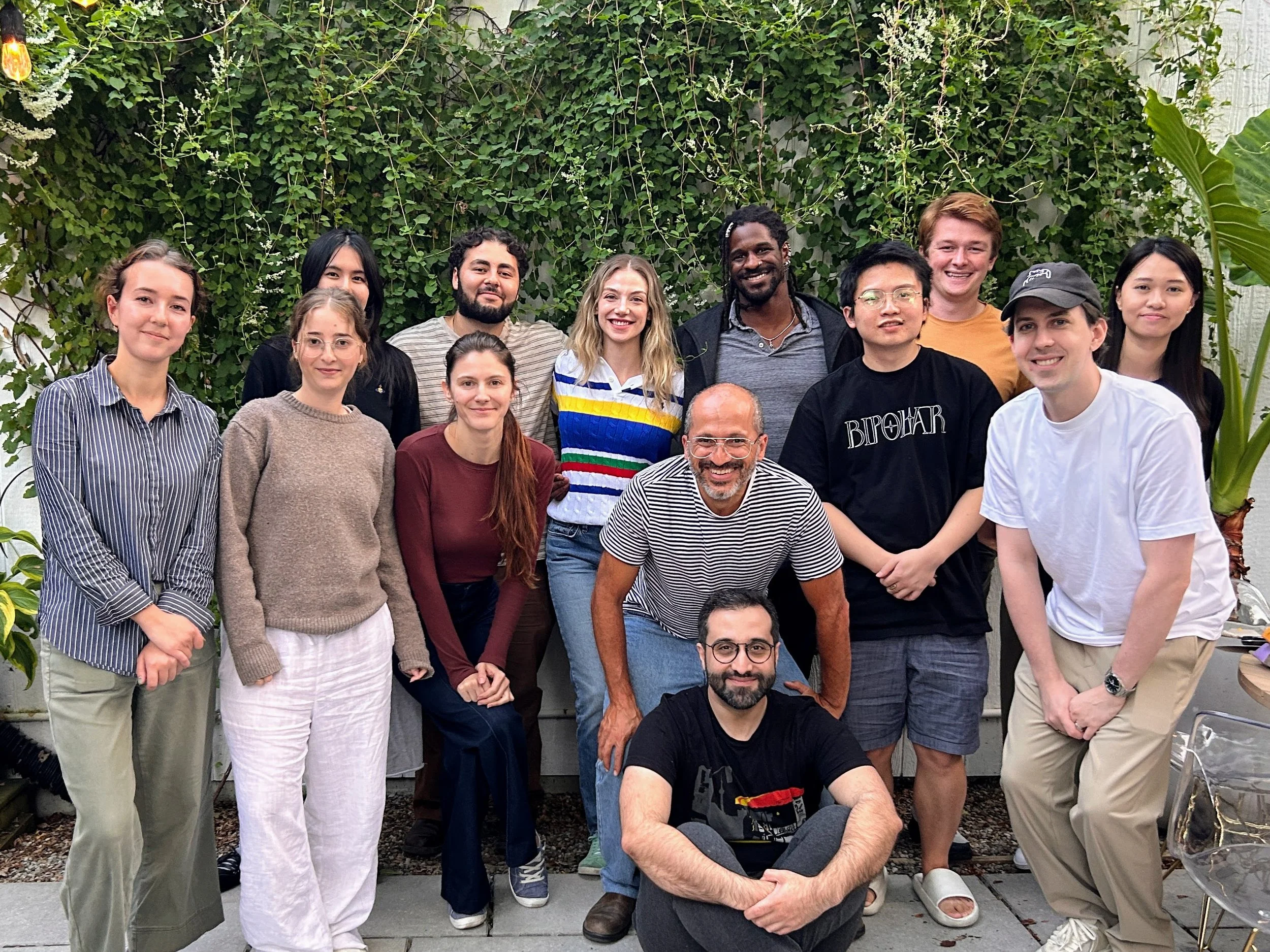Work and Play Lab

PRINCIPAL INVESTIGATOR

Michael Inzlicht, Professor of Psychology
Lab Manager

Phone: 416-208-4868
Email
Dariya Ovsyannikova is a fourth-year student at the University of Toronto Scarborough, working towards her Honours Bachelors of Science in Mental health studies, with a minor in Studio Art. Dariya is interested in exploring the ways in which mental health disorders like anxiety, depression etc. preclude individuals from engaging in both effortful and routine tasks and is particularly drawn to exploring the kinds of therapeutic interventions that may offer these individuals a sense of control and confidence over their lives. Within Michael Inzlicht's Social Neuroscience lab, Dariya is excited in exploring the whether the quantity of social media consumed by young adults influences their level of empathetic regard, both online and in direct contact with others- does the distance between people on social media produce a diffusion of responsibility for individuals who project negative behavior or attitudes upon others? In the future, Dariya hopes to complete her Master's of Social Work and provide psychotherapeutic treatment options, including art therapy, to clinical populations in Toronto.
Graduate Students

Advisor: Andre Wang
Email
Leif (Lay-f) Anderson is a PhD student interested in how people regulate their abilities to understand others and how they reason about empathy. More specifically, using both experimental and qualitative approaches, he studies (1) antecedents of how empathy is perceived (e.g., who receives, or is the target of, empathy), (2) how beliefs about and attitudes toward empathy affect people’s decisions to empathize (e.g., who do we believe deserves empathy?), and (3) how we can use AI as a tool to test how different forms of empathy impact those who receive it. Beyond empathy, Leif is also interested in how people deal with uncomfortable emotions and the role that governments play in regulating those emotions.

Advisor: Michael Inzlicht
Phone: 416-208-4868
Email
Aidan Campbell is interested in motivation. Recently, he has focused on exertion and how effort affects us and our perceptions of meaning. Specifically, does expending energy lead to more meaningful evaluations of our daily lives or particular behaviours? What are the effects of the absence of effort on human perceptions of meaning and happiness? Aidan hopes to investigate this relationship to better understands what contributes to meaningfulness and our overall well-being.

Advisors: Cendri Hutcherson & Michael Inzlicht
Phone: 416-208-4868
Email
Ziqi Fu is a first-year PhD student interested in effort, self control and decision making. Coming from McGill, she studies context effects in effort-based choices and effort aversion, as well as individual differences in cognitive strategy selection and risky decision making. Her work uses cognitive experiments and computational modeling to explain why people start, persist, or avoid demanding tasks. Through her PhD training, Ziqi aims to bridge lab-born theories of self-control with everyday goal pursuit.

Advisor: Paul Bloom & Yoel Inbar
Email
Zachary Grey is a PhD student interested in how people engage with morality perceptually, cognitively, and socially. Specifically, his research focuses on understanding moral disagreement, whether it occurs as a minor everyday quibble, a philosophical exchange (his favorite), or a polarized political debate. How do people think about and navigate interpersonal conflicts of moral values in everyday life? More recently, Zach has become interested in the intersection of morality, technology, and social judgment: are AI users perceived as being disconnected from their humanity and less deserving of empathy? If so, why?

Advisor: Michael Inzlicht
Phone: 416-208-4826
Email
Victória Oldemburgo de Mello is a Ph.D. candidate at the University of Toronto studying how technology shapes human behavior and society, focusing on social media and artificial intelligence. She received her B.A. from the Federal University of Santa Catarina (UFSC) and her M.A. from the University of Toronto. Her recent work examines how LLM characteristics like anthropomorphism and sycophancy influence user trust and belief change, as well as how people moralize AI and treat AI systems as moral entities. Her social media research explores how platforms can both foster and erode social connection, examining cross-cultural differences and the ways social media shapes beliefs and desires.
Dasha Sandra is interested in how beliefs and expectations shape people's experience of their mental health. Mental health awareness is often discussed in the media, on the internet, and in daily conversations. Because people are more aware, they are more ready to seek treatment, even for milder difficulties or as a way to cope. But does interpreting difficult life experiences as an early sign of mental illness lead to negative expectations about one's general mental health and, paradoxically, cause more symptoms? Is this a sign of nocebo effects (symptoms caused by negative expectations)? If this is the case, can it be reversed through better messaging? Dasha explores these questions through lab and field studies, and hopes to develop interventions to improve the discussion around mental health.

Advisor: Michael Inzlicht
Phone: 416-208-4826
Email
Emily Zohar is interested in how psychology-informed interventions can counteract day-to-day shortcomings such as procrastination and forgetfulness. Questions she hopes to pursue include, why do individuals fail to perform tasks that they hope to complete? How can interventions be created to help individuals reach their goals? How can scheduling be used to increase goal progress and prevent irrational decision-making? Emily hopes to use this research to promote real-world positive behaviour change.
THESIS STUDENTS
Mathilde Philippson
Chloe Shing
Volunteer Research Assistants
Powrnika Kugathasan
Riya Lakhani
Jean Rehani
lab Alumni
Timour Al-Khindi (M.D./Ph.D. student, Johns Hopkins University)
Veerpal Bambrah (Ph.D. student, York University)
Belle Derks (professor, Utrecht University, the Netherlands)
Greg Depow (postdoctoral fellow, University of California San Diego)
Nathaniel Elkins-Brown (research psychologist, National Traffic Highway Safety Administration)
Amanda Ferguson (postdoctoral fellow, University of Cambridge)
Zoe Francis (assistant professor, University of the Fraser Valley)
Marie Good (assistant professor, Redeemer University)
Jennifer Gutsell (associate professor, Brandeis University)
Jacob Hirsh (associate professor, University of Toronto, Rotman Business School)
Nicholas Hobson (behavioral research consultant, Psychology Compass)
Sonia Kang (associate professor, University of Toronto Mississauga, Rotman Business School)
Hause Lin (research scientist, Washington University in St. Louis)
Lisa Legault (associate professor, Clarkson University)
Marina Milyavskaya (associate professor, Carleton University)
Vincent Pillaud (assistant professor, University of Caen, Normandy, France)
Daniel Randles (senior business insight analyst, TD Bank)
Jessica Remedios (associate professor, Tufts University)
Achala Rodrigo (assistant professor, York University)
Blair Saunders (lecturer/assistant professor, University of Dundee, Scotland)
Julian Scheffer (assistant professor, Western University)
Katy Tam (assistant professor, University of Toronto)
Rimma Teper (senior director of behavioural science, RBC)
Shona Tritt (clinical psychologist; assistant professor, University of Toronto Scarborough)
Alexa Tullett (associate professor, University of Alabama)
Akina Umemoto (assistant professor, Montclair State University)
Ruolin Wu (Ph.D. student, University of British Columbia)
Xiaowen Xu (associate professor, College of William and Mary)
Filter By Keyword
- neuroscience
- self-control
- emotion
- motivation
- ego depletion
- cognitive control
- ERN
- effort
- anterior cingulate cortex
- prejudice
- empathy
- stigma
- meaning
- stereotype threat
- replication
- experience sampling
- self-regulation
- decision making
- uncertainty
- meta science
- religion
- cognitive dissonance
- education
- fatigue
- morality
- acceptance
- prosociality
- mindfulness
- political psychology
- artificial intelligence
Latest Tweets
News
A new study has warned that without intervention, ADHD education could cause many young people to wrongly diagnose themselves
Growing awareness and education around ADHD may be leading to false self-diagnoses among young people, a new study has claimed. Researchers from the University of Toronto say that while education is crucial, it may also trigger a mistaken belief that common issues that young adults face, like tiredness and irritability, are the symptoms of ADHD. The study’s lead author, Dasha Sandra, said young people should not be discouraged from seeking help, but believes mental health education needs to be refined to include more context around the symptoms.
Learning to play a musical instrument is hard. So is trying to run a marathon, writing a term paper, and caring for a sick child. These things involve frustration, pain, and disappointment — yet we do them anyway. In part two of Hidden Brain’s look at the allure of suffering, psychologist Michael Inzlicht explains what we get from doing things that are difficult, and why the things we think will make us happy often do not.
Listen Here
Collaborators
- Joshua Aronson, New York University
- Avi Ben-Zeev, San Francisco State University
- Elliot Berkman, University of Oregon
- Kirk Brown, Virginia Commonwealth University
- Daryl Cameron, Penn State University
- Belle Derks, Utrecht University
- Jennifer Gutsell, Brandeis University
- Greg Hajcak, Florida State University
- Eddie Harmon-Jones, University of New South Wales
- Jacob Hirsh, University of Toronto
- Cendri Hutcherson, University of Toronto
- Sonia Kang, University of Toronto
- Michael Larson, Brigham Young University
- Lisa Legault, Clarkson University
- Ian McGregor, University of Waterloo
- Marina Milyavskaya, Carleton University
- Sukhvinder Obhi, McMaster University
- Liz Page-Gould, University of Toronto
- Travis Proulx, Cardiff University
- Blair Saunders, University of Dundee
- Brandon Schmeichel, Texas A&M University
- Zindel Segal, University of Toronto
- Alexa Tullett, University of Alabama
University of Toronto
Organizations
- Association for Psychological Science
- Canadian Psychological Association
- Canada Foundation for Innovation
- International Social Cognition Network
- International Society for Research on Emotion
- National Academy of Education
- Natural Sciences and Engineering Research Council of Canada
- Social and Affective Neuroscience Society
- Social Psychology Network
- Social Sciences and Humanities Research Council
- Society for Personality and Social Psychology
- Society for Psychophysiological Research
- Spencer Foundation


"I am aware it's a machine but it's super convenient and knows how to listen well whenever I need it," says Anna, a Ukrainian living in London. She is talking about her regular use of the premium version of ChatGPT, a chatbot powered by artificial intelligence.
What Anna – the BBC is not using her real name to protect her identity – finds particularly valuable isn't necessarily the AI's advice, but its ability to give her space for self-reflection.
"I have a history with it, so I can rely on it to always understand my issues and communicate with me in a way that suits me," she says. She is aware that this might seem odd to many people, including her friends and family, which is why she has asked to remain anonymous.
Read More